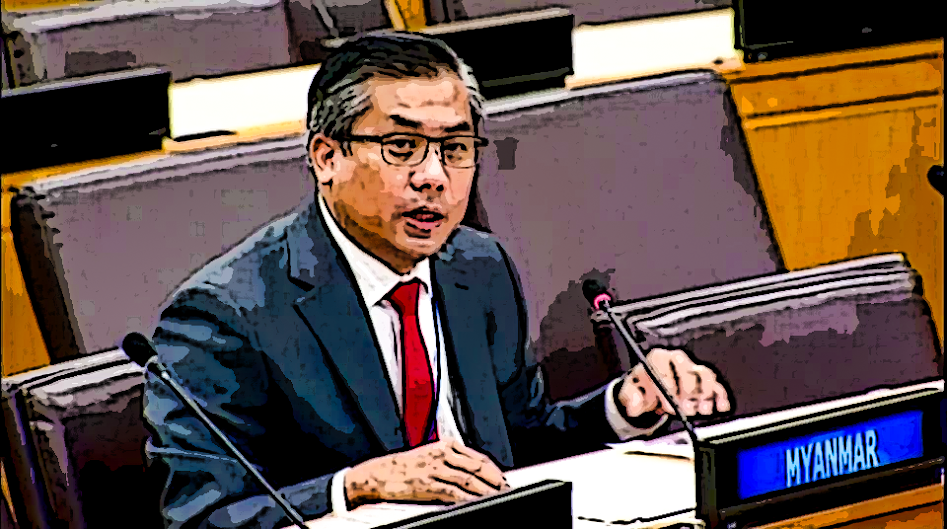Myanmar Spring Chronicle – December 19
Diplomacy and International Dynamics
MoeMaKa, December 21, 2023
United Nations Engagement and International Relations: A Complex Landscape
In a recent development on the international stage, the United Nations Population Fund’s representative has arrived in Nay Pyi Taw to spearhead support initiatives for women, pregnant women, and children in Myanmar. The mission also includes efforts to prevent sexual violence and other forms of aggression, as communicated through a tweet by the official.
Despite the military council’s attempts to function as a de facto government, many UN organizations continue to collaborate with its mechanisms. Since the commencement of the 1027 operation by ethnic armed allies, the military council has issued over 80 press releases, as highlighted by the DVB news agency.
In a significant decision, the UN has opted to retain U Kyaw Moe Tun, a symbolic figure of the Spring Revolution, as Myanmar’s ambassador for the current term. The military council’s third attempt to represent Myanmar at the United Nations General Assembly reportedly faltered, allowing Ambassador U Kyaw Moe Tun, aligned with the people, to persist as Myanmar’s representative. NUG Foreign Minister Daw Zin Mar Aung emphasized the opportunity for U Kyaw Moe Tun to bring attention to the challenges faced by the people of Myanmar under military rule. She urged all Myanmar diplomats to emulate his example and stand up for the people.
On the international front, the Spring Revolutionary forces and NUG government officials appear to enjoy several advantages over the Military Council. Military activities, including the 1027 operation, have witnessed the revolutionary forces, People’s Defense Forces (PDFs), and Ethnic Resistance Organizations (EROs) gaining ground with substantial public support. Analysts argue that the crisis induced by international sanctions, foreign currency shortages, and the inability to procure military equipment poses a daunting challenge with no apparent resolution.
A US government report revealed objections from domestic and foreign Myanmar organizations regarding the classification of PDFs as terrorists. Consequently, the US government clarified that this was not its official stance. Chinese intervention, at the behest of the military council, led to negotiations for a ceasefire between the 3 Brotherhood Alliances in northern Myanmar. Myanmar organizations issued a statement cautioning against interference in Myanmar’s internal affairs, emphasizing the need to prioritize the interests of the Myanmar people. This suggests a possible realization by the Chinese government that the people of Myanmar are united against the military dictatorship and its pervasive role in Burmese politics.
Chinese Foreign Ministry spokesman Wang Wenbin conveyed that China’s objective is to ease tensions on the ground between armed groups in Myanmar. Wang Wenbin affirmed China’s steadfast position and expressed hope for negotiations to promptly implement agreed-upon measures.
Daw Zin Mar Aung emphasized in a Radio NUG interview that international intervention should be geared towards eradicating the military dictatorship and establishing a federal union. She contended that a ceasefire in a border region alone would not resolve the issues, criticizing its lack of benefit for neighboring countries and its failure to bring about lasting peace.
On the global stage, political tensions rise as dictatorships and right-wing extremism gain prominence. Borderless terrorist conflicts in Ukraine and Palestine underscore the international repercussions of such developments. Russian leader Vladimir Putin’s threats to pursue advantages in the war against Ukraine present challenges for the United States and the European Union, struggling to impede the Russian invasion and fulfill aid commitments.
The Myanmar spring revolution, unique in its independence from significant foreign aid, has relied on internal forces, diaspora support, ground forces, and widespread public backing. This self-sufficiency positions Myanmar in a distinct stance amid global conflicts, allowing leaders and the Spring Revolution Forces to shape their destiny, irrespective of the influences exerted by major powers and extremists worldwide. The trajectory of Myanmar’s fate remains in the hands of those leading the Spring Revolution.

